The BoB CEO Interview: Aruba's Keerti Melkote On Digital Transformation, Innovation Overseas And The Big Partner Opportunity At The Edge
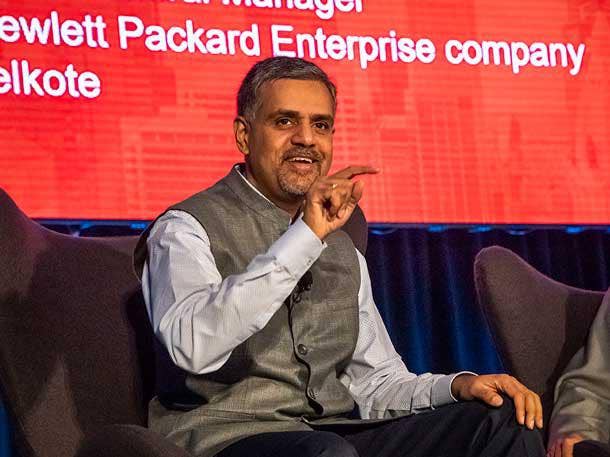
Melkote Takes Center Stage
Keerti Melkote, co-founder and general manager for Aruba, a Hewlett Packard Enterprise company, is no stranger to innovation. The longtime tech disrupter came from India to the United States to earn his master's degree, and later launched Aruba Networks when wireless was still far from being considered as a primary connectivity option for enterprises.
Now, Melkote believes that the future of digital transformation will reside at the edge. Services tied to edge software will create next-generation experiences for end users. Companies – regardless of vertical – need help implementing these solutions, and that's where solution providers come in.
Melkote took the stage at The Channel Company's Best Of Breed (BoB) conference in Philadelphia on Tuesday for an interview with Channel Company Executive Chairman Robert Faletra and CRN News Editor Steven Burke to share his view on Aruba vs. Cisco, the importance of artificial intelligence and machine-learning, and where the next opportunity lies for the channel.
Here's what Melkote had to say.
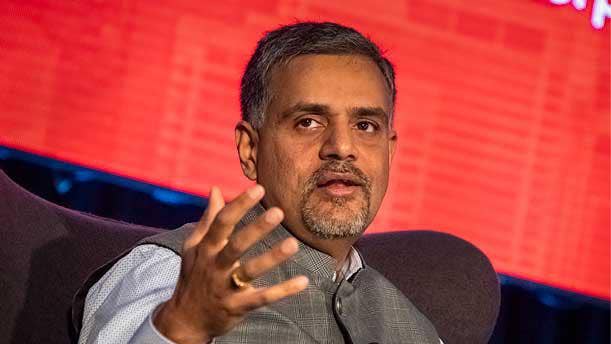
You have been really pushing edge computing and digital transformation. Can you tell us about where you see the edge, why it's important, and where is the opportunity for solution providers?
Typically, when we start these events, the opening theme is around disruption. You don’t need to go too far to see that every industry we're in, every company is getting disrupted with digital. Amazon is the poster child for it, but if you take [other examples such as] Airbnb for hospitality, the enabler is digital and digital is many things -- its mobile, cloud, and IoT -- and fundamentally, the business models of the brick and mortar organizations are completely changing. It's not just the U.S.; it's happening globally. The last decade of disruption has been primarily because of cloud and mobile. The rise of AWS, Azure, and of course Apple and Android is where the digital economy has grown up, but if you look at the next ten years, all of that disruption is going to be happening at the edge; where we physically are, at the stores, at hotels and schools -- where activity and business happens -- that's where we see the opportunity.
Can you give us an example?
We have retailers looking to transform the shopping experience or hotels looking to transform hospitality. When you walk in to the front desk at a conference at a hotel, it's really aggravating to collect my badge, but with digital you don’t have to do that. You can actually transform the experience. A lot of this is being driven by this idea of how do we fundamentally improve the experience of the customer? We see emergence of the experience economy on the one hand and the emergence of the edge coming together to drive more business value overall, and tech is going to be deeply infused in it. That’s where we see a rise of the edge computing opportunity and I would say a huge growth opportunity.
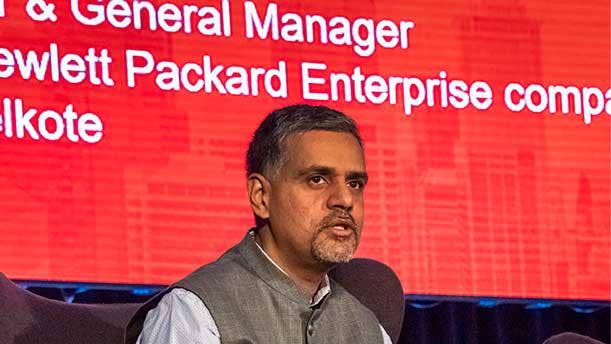
How important is software at the edge versus hardware?
I think fundamentally the transformation opportunity is really in the software and services. The hardware is a means to an end. The business model of the 80s and 90s was about moving hardware, but the modern business model going into 2020 and beyond is really around software components and how it integrates up and down the stack in terms of creating business value and then and offering it as a service. The consumption model itself is changing to because the primary business of customers are not in tech; it's retail and hospitality, and they really on partners for that tech, so it's more amenable to a service-oriented business model.
What kind of skill set should partners be looking at acquiring to help them deliver solutions at the edge?
I think the one of the most important tech talents are the ability to do programming. if you look at tech talent today in most organizations, its more about consuming products, configuring and maintaining and setting things up so it works for the customer, and that era is going to come to an end. Increasingly, as more products are exposed to the surface is less through GUIs and more through APIs, a programmer has to figure it out and integrate multiple vendors into a solution, so software programming and the classic computer science background is extremely critical.
The other piece is the ability to manipulate data. There's a ton of data being generated from the cloud, so things like machine learning and AI are going to be a massive trend in the market, so the ability to be a data scientist is a big area that we see emerging. The last area I would add is security. As [companies] rely on tech to run their business, we all know the security threat exposure, and if you compromise technology, it's no longer compromising productivity of the workforce, its fundamentally compromising your business, so security skills are the third leg of the stool.
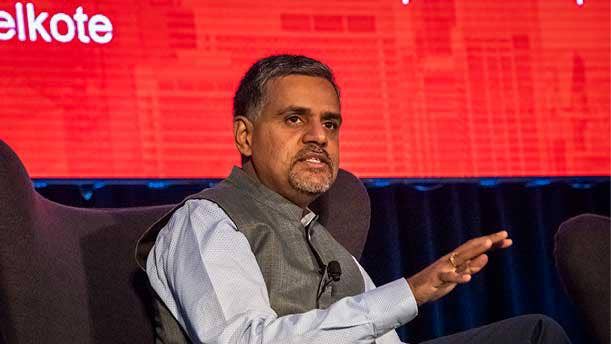
Tell us about Aruba's security vision and strategy of being secure at the edge?
When I started Aruba back in the day, I felt wireless was going to be a disruptive force, but when I spoke to customers the constant feedback I got in 2002 was we will never do wireless because it's not secure and the radio waves are going to show up in the parking lot which means anyone can plug in to my network. We had to go overboard in securing the radio waves, so we incorporated a bunch of technologies like authentication, encryption and firewalling, but basically what we invented in the process was inside-out security. if you think about security on the network, most of the investment dollars go to outside-in, so keeping the bad guys out. That typically means implementing firewalls, intrusion detection systems that protection the outside from the inside, but the modern threat is coming from the inside. Typically, there's a piece of spam that you're compelled to open in email -- it seems very direct and targeted -- you open it and the malware starts to spread horizontally and no one is watching. Our thesis is you can't just project yourselves from the outside-in, you have to protect yourself from the inside-out. This is why we've been making investments in how you build security from the inside and the products have to be secure, but more importantly, the processes and the ability to know who and what on the network, know what they are doing, and then do continuous monitoring to ensure bad things are not happening from the inside is equally important opportunity and it's still an untapped opportunity. If you project it out, the insider threat is probably the number one threat in the market today.
If you go into any large organization, they might be dealing with many vendors and different operating systems. How can partners drive down the number of security products customers need?
I go back to the need for as-a-service delivery. One of the skillset that is sorely missing is the ability to operate a security operations center. The very top of the enterprises having a security team that is constantly looking at security alerts trying to coordinate what is happening, and basically protecting their enterprise. The fundamental thing is, all these tools out there generate alerts, and someone has to look at, 'Are these alerts the real thing or are they false positives?' Today that work is being done by humans. I think machines are going to help in a big way to reduce the number of false positives. AI and machine learning is going to be a big trend in that area. We have invested in that area to apply data science and machine learning to reduce false positives, but it still doesn't take away the need for experts to correlate, 'What's really happening?' Because only the top enterprises can afford this, the rest of them are saying, 'We have an urgent need to be secure as well. Can we buy this whole thing as-a -service?' So, the rise of managed security providers is increasing in a big way. That's a way I can see how the partner community can absorb the innovation coming from vendors. Innovation I think is going to happen in security because you always have to protect the brownfield stuff that is already out there while you are trying to build security from the inside. So generationally, I think things will get better and the number of vendors will probably go down, but from a customer experience standpoint, that's where the partner community can help in a big way.
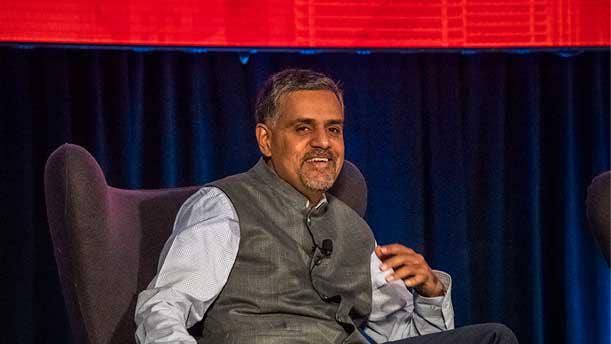
What investments has Aruba made in Artificial Intelligence and machine learning?
As we talk about the edge, one of the biggest drivers is transformation of user experience. No matter who I talk to, the three initiators they all care about the most is: user experience of whoever the users are – employees, shoppers, students -- no matter what the organization is they care about their users and user experience because that fundamentally is the value of the infrastructure is bringing -- security and data. Those are the three legs of the stool. User experience to me will be infused with everything we are going to do. We started with the acquisition of Niara which we bought about 18 months ago that addresses security. More recently we acquired a couple of companies, one is Rasa Networks which we launched as a network product to take data from the network and provide tools that predict what user experience is like from the network perspective. Customers said, 'That’s great that the network is trying to guess what the experience is like, but it could be better if I could directly measure user experience.' So that's what Cape Networks does. Cape is a tool that allows you to deploy sensors out where the users are and runs synthetic tests of critical business applications and gives a direct sense of that the user experience is like. You can test against popular SaaS applications or homegrown custom applications or against legacy apps -- you can create a custom test for you as an organization. If you look at the dashboard, it literally uses smiles to show of the user experience is at a current time – customers find it very critical. Retail stores, for example, they want to know before they open that all their critical apps are available to the customer and available all day; otherwise they can't run their business. So, we find the ability to measure user experience and proactively address any challenges associated with it is critical.
On the competition side, why are you better than Cisco and why should partners become big with Aruba?
One of the foundational premises of Aruba was the realization that the user community is going to migrate to a primary wireless world. I love Cisco. I was at Cisco in the 1990s and part of the Catalyst revolution, and we used to use at Cisco were, 'We are going to plug the enterprise into the internet.' But business-model-wise, if you're a business that relies on connecting everybody with four ports to each desk, you don’t need that anymore. You can dramatically reduce the wired footprint and provide wireless as the primary means and that changes the equation in terms of where the investment goes and that's been a disruptive force. We called it 'mobile first' architecturally and it's really resonating. It really started to take off during the last economic downturn. CIOs were looking for places to save money, and I said, 'Llook at all the ports you have that aren't being used.' Budgets don't go away, they just get repurposed. Instead of budgets going to wired, you have it going to wireless, security and services. That’s where we think the wireless shift happened and for obvious reasons, Cisco finds it disruptive.
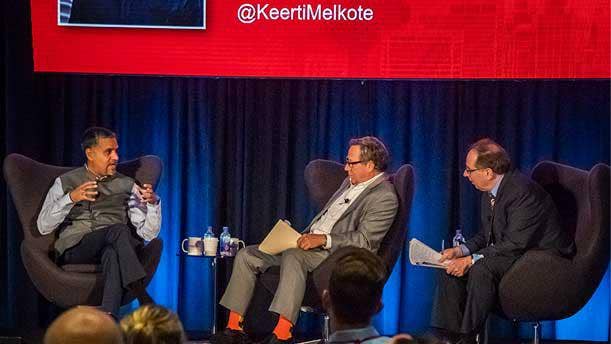
How has the 'mobile first' concept been received by customers?
Even today, when we go into a business and talk mobile first, we don’t get silence from the other side. The foundation of mobile first has been software. The signals go over the air, but security software and location-based services go on top of platform, and that’s been the story so far. But as you start to think about the next 10 years, mobile has been a significant differentiator for Aruba. IoT and Security will be the next big one. Every experience that we are talking about is taking advantage of the fact that I know where you are, and I know that based on the physical location the characteristics of the space you are in, and then how do I create digital experiences. I see a ton of great examples, but it's even about simple things like transforming meeting experience. It's a painful experience and we have been trying to get better at it, but thanks to things like voice interfaces and [Amazon's] Alexa, and thanks to knowing my location based on my mobile device, I can walk into a room and have the room interact with me and say, 'Do you want me to set up you meeting?' and make the call happen. These kinds of experiences are what are going to differentiate Aruba. Even if Cisco were to come at it from a technical perspective, they're not embracing it from a business model standpoint.
When I went to Silicon Valley in 2002 to raise money for the company, these are all smart people who asked, 'Why won't Cisco crush you? What's your sustainable differentiator over the long-haul?' and my thesis was very simple. In wireless there was a ton of innovation, but also it was a business model disruptor. Fifteen years later, having built our organization now, I think we invented another thing which is our true differentiator, and that is our culture. I talk about it a lot with my team. We, by necessity, were very customer-focused. I can think of technologies in my head, but if the customer doesn’t embrace it, it doesn’t matter. The way the organization works top-down is "customer-first, customer last." It's built into the DNA of company and our partners have been with us know it and experience it. Being humble and being hungry and being able to listen to what customers' need are and responding with solutions leads to good outcomes, so I think the soft aspect of that is as important as the hard aspect.
Can I make more money with you than I can with Cisco?
Absolutely, and that is really what it is. You make money that is sustainable. You can make money, gross margins, on moving boxes and that's a business model everybody knows and understands but the longer-term value is in actually monetizing the boxes that you sell. If you think about your businesses, a lot of boxes used to be sold in the data center and that business opportunity is going away -- I think most of you know that -- because of the cloud. So you're forced to start to think about software. What I tell customers, going back to the edge: the edge isn't going away to the cloud. You still need the network to get to the cloud. You still need wireless, you still need wired. So that opportunity that you have to go deploy this hardware is the opportunity to build your franchise from. You're going to make money deploying and managing the infrastructure, but think in terms of the long-term monetization opportunity of the infrastructure you just put in. Don't walk away from the infrastructure and just maintain it. What can you build upon it, like location or security or software, and that's what I'm betting on is that that footprint that we are deploying allows you to monetize it over a period of a decade not just a transaction. And I think that that's really the way to think about it and services. I mean, without you guys we can't get there, to be totally honest. I see a huge opportunity, but I don't see it without you.
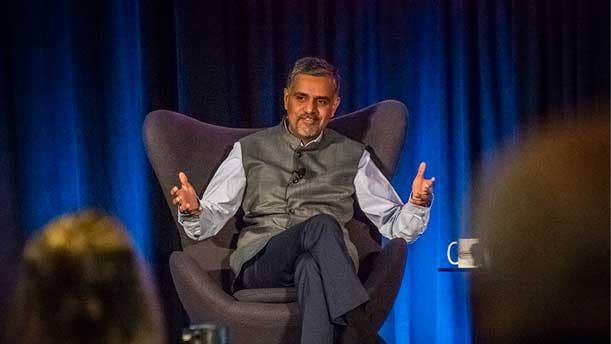
Can you talk about how you're bringing that architecture to Hewlett-Packard Enterprise and the 8400, the switch that you guys announced last year, and how you're the foundation of the enterprise security approach that HPE is building?
If you think of the Aruba platform, it started with access, how people are connecting to the enterprise, wireless or wired. As we started to grow that platform with software the customer basically said, 'Why do I still need to plug into somebody else's core switch? The Catalyst 6500 from Cisco for the most part. And also, 'Why do I need to plug into somebody else's router connecting to the wide area network?' So we saw both spots, the core of the network and the WAN, as opportunities to integrate into the architecture. And so first we introduced the Aruba 8400s last year as the core switch that aggregates the edge and then this year, we introduced our SD-WAN offering that allows you to plug into the cloud -directly. And so now you have consistent infrastructure at the foundation that goes on-prem with software-defined capabilities that spans the entire set. So it's one system. And, you know, going back to Cisco, we acquire companies but one of the things customers hate is that every company has their own interface, GUI, and so they call it 'swivel chair management.' If I want to manage wireless I'm facing this console, wired I'm facing this console, WAN I'm facing this console and so on. I have a bunch of consoles all around me, and what they are saying is, 'I want a single pane of glass that I can manage my estate from.' Yu can only do that if you do organic development. SD-WAN is a good example, our core switch is a good example. We didn't acquire any of that, we built it in house. So technology innovation is critical for us to ensure that 'single pane of glass' experience. We are going to acquire companies to deliver AI and security into the platform, but the platform is organically built so we can deliver on that 'single pane of glass' vision, which I see as foundational for differentiating us in the long term.
Is there a big architectural disaggregation going on when you look at the competition and how they're approaching security in the network of the future?
Disaggregation is happening from a hardware to software standpoint, absolutely, and I think I think the value is shifting to software and you should expect that from everybody in the market. The hardware itself is going to get commoditized. I think we've seen that disaggregation already happening in the server context. I think the networking context, I don't necessarily see disaggregation in the same way happening, but value shifting is definitely going to happen. The value attributed to hardware will continue to decline in the value of attributed to software and services is going to grow.
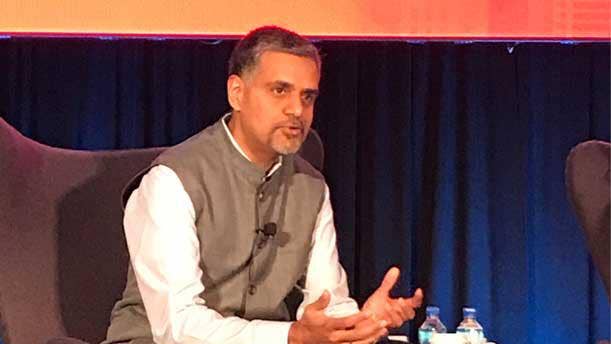
What's on the horizon, what products are you going to be bringing to market?
I think I think the next big wave I see is really around IoT. IoT is about data first and experiences second. So, how do you bring sensing the physical environment around us. No matter who you are or what business you're in, IoT is going to be a core part of what that business is going to do. And so sensing the world with data and making sense of the data, are massive opportunities and then using the data to transform experiences, closing the loop, and this is going to happen at the edge. We started 'edge' as a buzzword a couple years ago saying, 'Hey, what could we do outside the cloud that would be interesting? And we said, 'Actually, the edge.' But what I'm telling you, the amount of innovation that I see around the globe around this idea of the edge is massive.
So what kind of products are you going to bring to bear on this, what will I be able to do differently?
Let's give concrete examples. I think that's an easy way to think about it. We have a very large restaurant chain that is a customer of ours. They make burgers. I can't use the name, but you guys can guess. Their critical asset is kitchens. If anything in the kitchen stops -- it could be a fryer, it could be an oven, it could be whatever -- their production line stops, and they stop making money. That kitchen equipment today is not connected but it will be connected through instrumentation so they can monitor what's going on with the kitchen and proactively maintain the equipment before the kitchen actually experiences downtime. Simple example, but no matter which business you're in, you have critical assets that are producing revenue for you. What I see happening is these kinds of new opportunities starting to pop up, and our goal is to give you software that allows you to collect the data and create solutions that deliver business value.
For another retail example, let's talk about grocery stores, electronic shelf labels. They're still physically changed, right? You go out there every whenever you want to change prices of an item. You walk to where the item is and change your shelf labels. Those are going to be electronic. And so you can now do remote changes, so 'everyday low prices' will be remotely administered. You can just change the price whenever you want. These are examples of IoT that are going to happen. The infrastructure that allows you to bring this in, our access points are going to be IoT hubs, our switches are going to be IoT aggregators. What are typically called networking devices will become edge compute nodes. You will you will always sell servers for legacy applications. But these new applications are going to be embedded into the network fabric, and that's where we see the growth of a whole new generation of software.
How fast do partners have to get ready to sell this stuff?
This is happening now. Electronic shelf labels is happening now. The restaurant example I gave you is happening now. ... It's still early, I wouldn't say it's all past tense. But this is the opportunity. This is the this is what happened in 2008 when AWS came out and people all thought it was a hobbyist platform to go build software but look at where it is 10 years later. That's what's happening at the edge. IoT is happening and the faster you are to the opportunity, [the better]. We will obviously do our best to bring that to our customers and our partners, but it's really up to you to absorb it and embrace it and take it to the market.
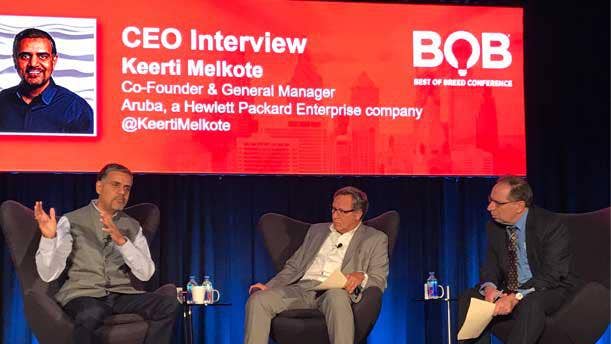
With the advent of IoT and the edge and the massive amount of data that's going to be incorporated within organizations and enterprises over the next 10 years or so, it becomes difficult to discern the difference between the data you want and the data you don't need. Do you see organizations embedding analytics and these types of applications at the edge or do you see more companies investing in analytics platforms so they can get a quantity of scale of developing applications?
This is a very, very deep question. I think there was an explosion of creation of data lakes in the last, I would say, five years, a lot of customers implementing Hadoop and all kinds of architectures inside the data center to aggregate data and what they're finding is, 'Okay. I have all this data. What I'm going to do with it?' And there's not enough of the analysis tools as you mentioned, right? So they typically end up hiring data scientists in-house to make sense of the data that's there. But I think the next opportunity is analytics companies and analytics built into the products that are already coming up to give the dashboards the business value that the customer is looking for. So I think there's always going to be two camps. There's going to be a camp that's going to say, 'I'm going to have my own team of data scientists that go to go deep in my enterprise data and give me business value,' and then there's going to be the dashboard team, so to speak, where partners like you and vendors like us can crunch big data and give insights through dashboards so it's more ready to consume.
So it's not going away? It's going to be more of an application of applied analytics?
And delivered as a service. I think what they're finding is, 'I'm spending all this money on infrastructure, but I'm not getting the business value out of it. What I'd rather do is get the business value and you figure out how it all comes together.'
You made a decision from the beginning to really be multi-vendor. How big a danger as we make this Internet of Things transformation is lock-in? IoT lock-in?
I think lock-in is a massive issue in the infrastructure space, and I if you think about the current need to be relevant in the long term in the business and the market, lock-ins don't lead to them. The market is moving way too fast. Agility is the name of the game. A single vendor cannot do everything. It's just impossible. And so you have to foundationally embrace the idea that innovation has to happen in a crowd. Everybody has to come together, and value is going to be built over APIs and software. If you embrace that world multi-vendor has to be the DNA. Just like security has to be the DNA, the multi-vendor approach has to be in the DNA. Best of breed, the name of your conference, is in the DNA, right? So you have to think of what is best for that situation and maybe have the freedom to make that choice and then move forward. Anybody who's trying to lock the customer in, there is an allergic reaction to them from a customer base standpoint. They've experienced lock-ins of various types over the last few decades and they know fully well that they can't embrace the change that they need to embrace if they're locked into some platform. So I am seeing the rise of this API economy as the thing that breaks that, the rise of APIs and software that breaks that single-vendor proprietary lock-in and makes it more open.
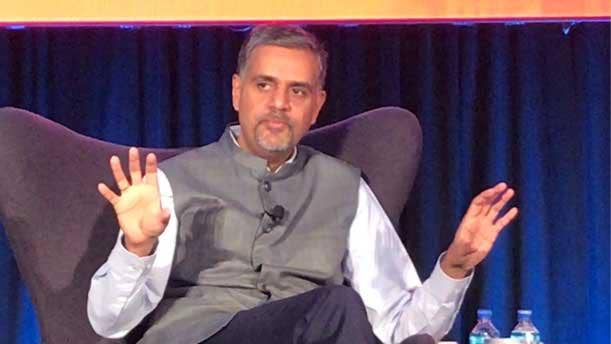
You grew up in a very different environment than many people in this room. How was it that you came to the United States, what prompted that? Why are you still here?
I came here 25 years ago, more than that actually 1991, so 27 years ago now. I got my bachelor's [degree] in engineering in India, grew up in India. And this was a world where the Indian economy was a closed economy. It was not open to free markets, very regulated. We could have called it a socialist kind of economy, and having grown up in that world, it was a developing economy and we came up from pretty humble roots. So when you do that, you're always thinking of what allows you to be more stable in your life, from a monetary standpoint, from the stability standpoint and the words of wisdom that I learned from my parents were that education is the way out. The more educated you get, the more opportunities open up for you and you do something with it. And so I came to the States to get educated and came here to get a master's degree. I went to Purdue. It's a great engineering school, by the way. My intent was that I loved technology and I wanted to go get a Ph.D. but in 1993 I had racked up enough student loans, which I a lot of kids can relate to these days, and so I had to pay them off and I was lucky enough to get a job from Intel back in the day, and the rest is history. So I got to Intel and being in Silicon Valley, the entrepreneurial spirit is in the air and so you challenge yourself every day to go, 'What's special about you? What's different?' And so I wanted to go do something to make a difference and having experienced being part of big companies like Intel and Cisco, I wanted to see what I could do with my own two hands. That's what Aruba was, but to your question about why am I still here, why not India? The world and the Indian economy has changed in a dramatic way in the last 25 years, coincident with my departure from India. That's the time when the economy started to open up, outsourcing started to become a thing, and tech jobs started to go to India. It really grew up in a big way after the internet came to be, and you really could connect remote teams in a much better way, a much easier way, to be able to collaborate. IQ is not exclusively the domain of a single country, right? Everybody's smart everywhere in the globe. As long as you can apply your smarts and be innovative, you can innovate anywhere. That's what I've seen in the Indian market. Today the Indian economy is doing extremely well, and today if I was growing up in India, I probably wouldn't be leaving India. I'd start Aruba right there.
Do you think India can catch up with China?
It's a long-term thing. I just talked about my own span here in the U.S., 27 years, and I've seen dramatic changes. So if you start to think about the next 20 years, India is going to be a massive, massive economy, a massive force similar to what we see China as today, but you also asked why am I not going back there. Because of kids. You come here, you grow up, you make your living here, you make a family here, and the kids grow up and identify with this place. Just like India was the place I grew up, America is the place they grow up. So if I want to be with my kids, I need to be here.
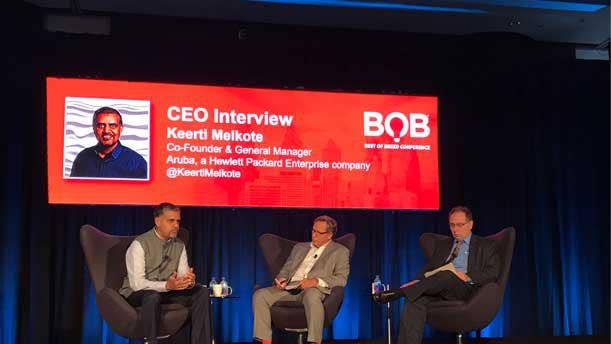
How do you think about the immigration issue? How should we handle trying to get the top folks that do go to Purdue to stay here? Are we doing the right things there now?
No, we're not. We are absolutely looking inward, looking backward. I'm extremely disappointed in the current stance on immigration, which I think is totally wrong and really hurts the competitiveness of the nation. I think people don't realize that it is a globally connected world and there are very hungry entrepreneurs everywhere, and everybody is looking to innovate. I was in Thailand a month ago and I was talking to some customers. Amazon is not very big there, and there's a company there disrupting retail in Indonesia and it's not Amazon, it's another name. So that disruption is happening globally. America was the place that attracted the best and the brightest to the land of opportunity, and people came here because the universities were phenomenal, you could get a great education, but also because you could innovate, it was an open economy. The ecosystem to raise venture money, to be able to take risks and make something of yourself was significant. The world is learning, and they want to emulate Silicon Valley. They want to emulate New York, Manhattan. I see that happening with earnestness at a time where we need to be more open. We are closing, and I just find that very disturbing, actually. I don't think it's sustainable. I don't think it is going to work that way long term.
Can you talk about the work you're doing with entrepreneurs in India?
When Aruba was bought by HP, headlines all over, especially in India, said we sold the company for $3 billion dollars. So, you know, everybody thought all $3 billion dollars went to my bank account. They don't realize it was a public company and the stockholders really got a lot of that value. But nonetheless, people think that I can invest in their ideas, so a lot of ideas that come my, way both in Silicon Valley and in India. What I find refreshing is is the fresh eyes with which they're thinking of modern problems and how they how they want to solve it and they're typically looking for guidance in terms of not only the technology disruption, but how do you set up a business? How do you how do you think about it from a three, four, five years, ten years standpoint in terms of sustaining the business. So I love a talking to entrepreneurs. It gives me energy and gives me fresh ideas, and hopefully I'm able to contribute back as well.
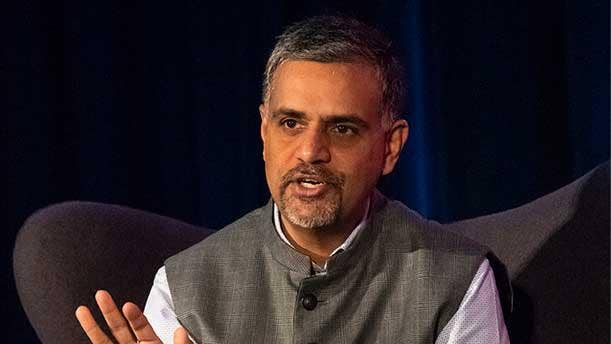
There's an interesting story in the Wall Street Journal today. A woman had who had just quit her job was on the couch crying and Amazon's Alexa came on and said, 'Everything's going to be alright.' She didn't say, 'Alexa,' and they can't figure out why that happened. Knowing what you know about security, the edge and networks, would you have an Alexa or Google Home or one of those devices in the house?
I do. I have all of them, as you can expect. Here's the interesting part. We constantly have this debate, right? So I'll tell you an inside story. We had a board meeting at Aruba, and this was right after the acquisition and [former HP CEO] Meg [Whitman] and the entire board were going to come down to the Aruba offices and have the HP board meeting at Aruba because they wanted to experience a smaller company. And so when they came in I wanted to obviously wow them with technology. And so I had some demos that took advantage of Alexa in the room. And after the board meeting, I was told that Alexa records everything. Honest to God truth, we had to go scramble like crazy to figure out what data is out there on AWS, all the confidential board discussion that was going on. Fortunately, we discovered later that they don't keep any of the data. It's just used for hearing the word 'Alexa,' or whatever keyword. But I'll give you the flip side of it. Security is deep, and we have to really consider deeply what this live communication between your voice and the cloud is. The flip side, I'll tell you is at home because I actually have a Google Home speaker at home. My wife always found it frustrating to find an app, find her music and play the music at her choice at that moment in time the kitchen, and my speaker system was barely used. And now with the Google Home, she just says, 'play morning music for me,' and it does it. So I can see it, if the experience is great, making its way.
How far away are we from being able to talk from these devices to our doctors or to other service providers and change the way the elderly live in their homes?
I think that the next decade you will see it happen because live natural language processing is here. You can see the technology getting better because it's learning. There are a bunch of things coming together: natural language processing and machine learning are going to train the next-generation systems to comprehend what we say better, parse our accents, figure out what we are actually saying, and then of course, we are trying to facilitate that connection to your doctor. That's still a human-to-human connection to your doctor, but translating that and making it happen, I think the voice interface is going to be very, very important.
If you were starting a solution provider business today, what area would you drive into?
I would definitely focus on the edge at this point in time, all aspects of the edge: the networking piece, the security piece, the compute piece, the software piece. I would look at what are the core skill sets I need in my organization and build it from the ground up, and I would design it to be a software-first operation.